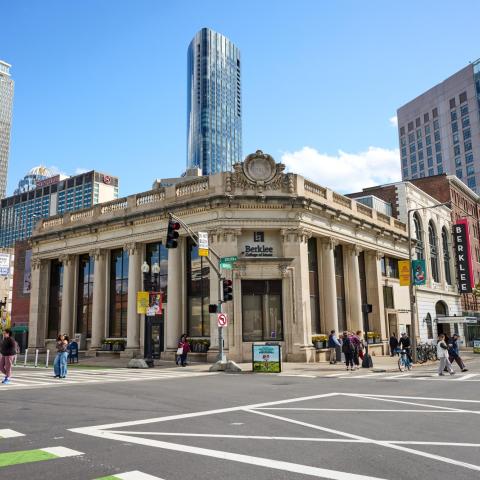Technology 101 for Music Educators

From the left: Representatives from Apple Computer Daryl Hawes, Melody McClain, Berklee V.P. David Mash, Doug Brooks, Wendy Fisher, and Norah Alexander at the technology conference
On October 14, Berklee faculty members and experts from Apple Computer teamed up to present a conference for K-12 and college music teachers titled Music Education and Technology in the 21st Century. The event featured a variety of speakers, panel discussions, question-and-answer sessions, and campus tours—both virtual and physical. The conference drew a number of area music educators to Berklee and provided a useful exchange of ideas on using technology in a classroom environment. The event was also webcast via QuickTime to Apple Market Centers across the nation.
Among other things, conference attendees were treated to demonstrations of MIDI sequencers, musical notation software, and a cross-country musical exchange. A performance by the Hilltop High School Music Technology Ensemble of Chula Vista, California, was transmitted via video teleconference to viewers in Boston, and Berklee's Techno-Rave Ensemble, in turn, performed for viewers in California.
Panelists included members of Berklee's faculty and administration David Mash, John Hagon, Harry Chalmiers, Dan Newsom, and Michael Moniz, as well as Dr. Thomas Rudolph, director of music for the School District of Haverford, Pennsylvania; Stefani Langol, muisc technology coordinator for St. Ann's School in Brooklyn Heights, New York; Steve Antosca of the Levine School of Music in Washington, D.C.; and Gordon Duckel, music department chair for Newton South High School in Newton, Massachusetts.
The event was Berklee's first step in a new initiative to assist music educators in developing K-12 music curricula that takes full advantage of the latest developments in music technology. The college recently received a $1,000,000 grant from the U.S. Department of Education to fund the undertaking.
The goal of the initiative is to encourage future teachers to embrace technology as a teaching tool and to improve students' interest and proficiency in music.
Speaker Stefani Langol made a presentation to teachers about types of computer labs (teacher and student stations, portable workstations), hardware and software needs, and networking issues. Thomas Rudolph described how the addition of music components to a school's computer lab can help to nurture a student's creativity and critical thinking skills.
"It is important for teachers to feel just as comfortable using a MIDI sequencer in their classrooms as they are with using a CD player," said John Hagon, chair of Berklee's Music Education Department. "Technology can enhance learning in all areas of music education, from theory to history to composition to performance."
As Berklee's music technology initiative moves forward, the college plans to share its findings with other music educators by hosting educational conferences and webcasting the conferences to local sites around the country. Information and updates about the grant program can be viewed at <http://pt3.berklee.edu> on the web.
—Sarah Godcher




